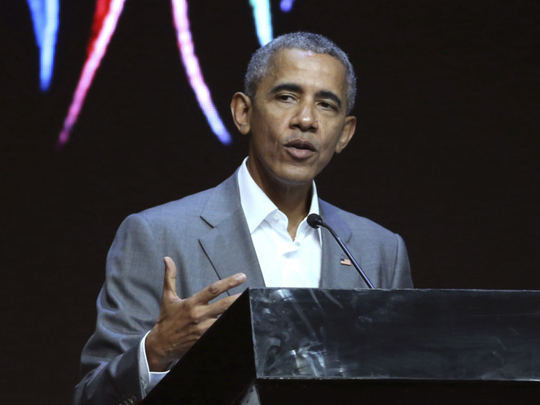
Donald Trump Jr and his brother-in-law Jared Kushner will give private congressional testimony this week as the United States Senate’s investigation into ties between Russia and the Trump team gathers pace. While the Moscow issue hangs over much conversation in Washington, the new administration’s foreign policy in its first six months has been dominated far more by the rolling back of former president Barack Obama’s international legacy rather than any new Trump doctrine, or specific grand initiatives, such as the proposed reset of Russia relations.
In the last few weeks, Trump has started to unwind an array of Obama’s legacy initiatives, including US involvement in the Trans-Pacific Partnership (TPP) with countries in the Americas and Asia-Pacific; partially rolling back the liberalisation deal with Cuba which saw the two countries restoring diplomatic relations, and introduce a suite of measures that eroded the bilateral sanctions regime introduced during the Cold War era; and he has started the withdrawal process from the Paris climate change agreement.
Moreover, with United States President Donald Trump’s commitment to put ‘America First’, he is also rhetorically committed to a further spectrum of measures, including reviewing and possibly withdrawing from the North American Free Trade Agreement and the prospect of ending the Iranian nuclear agreement. Trump’s rollback of Obama’s foreign policy legacy comes at a time when there has been rising criticism of his own administration’s international stance. And this is not just true over Russia where the president’s proposed reset of relations with President Vladimir Putin has been frozen by concerns over alleged inappropriate ties between key aides and Moscow before January.
U-turns and incoherence
Trump was elected last November with expectations that US foreign policy could undergo the biggest change since 1945 with the president challenging key elements of post-war orthodoxy pursued, in different ways, by Democratic and Republican presidents based around US global dominance, and commitment to expanding the liberal democratic order. Yet, while this has been borne out in some areas, including international trade, what has been at least as noteable so far has been the U-turns and incoherence of US policy.
For instance, although Trump has long criticised the Paris climate deal — giving notice he was last month pulling the US out of it — he indicated when he met French President Emmanuel Macron earlier this month that he may reverse course. This comes after intense criticism of Washington’s abdication of leadership in tackling global warming from many stakeholders, including, ironically, from multiple US private sector players, which is embarrassing for the president given his business credentials.
Corporate critics of Trump’s actions on Paris assert that while the agreement is far from perfect, it represents a welcome shot in the arm for attempts to tackle global warming and, crucially, a new post-Kyoto framework has been put in place. They also argue that Paris is unlikely to unravel even if the US does ultimately pull out, which could put US-headquartered firms at competitive disadvantage vis-a-vis international competitors, which contradicts the president’s argument that the deal is a massive “job killer”.
During last year’s election campaign, the president’s “Make America Great Again” platform asserted that Washington had become significantly diminished on the world stage under Obama with weak presidential leadership accounting for this. However, this critique was much too simplistic in ways that have become clearer over the last six months.
Trump’s criticism of Obama’s foreign policy often neglects that, while the US remains the most powerful country in the world — certainly in a military sense — it is not an all-powerful hegemonic power. And this core fact has been demonstrated repeatedly over the last two-and-a-half decades, from Somalia in 1993, Iraq and Afghanistan since 9/11, and also most recently in unstable states like Libya.
As Trump is fast discovering, current international political fault lines — where there are no easy quick-fix ways for the US to enforce its policy preferences — include: The nuclear stand-off in the Korean peninsula, which may yet become the president’s first major foreign policy crisis; continuing instability in Afghanistan; the bleak prospects facing the Israeli-Palestinian peace process; and the fact that international terrorism remains a significant global concern even more than a decade and-a-half after 9/11.
Highest geopolitical risk
The Trump critique of Obama’s foreign policy also often fails to acknowledge that in the current fluid and complex international political and economic landscape, Obama had some significant accomplishments with the potential to deliver greater international stability at a time that some characterise as having the highest geopolitical risk since the end of the Cold War.
One example here is the 2014 nuclear deal with Iran and six other powers — the US, China, Russia, United Kingdom, France, and Germany. The agreement, which Trump has criticised and still threatens to withdraw from, could enhance global nuclear security and also constitute an important win for long-standing efforts to combat nuclear non-proliferation. To this end, despite the president’s rhetoric, several senior Republicans on Capitol Hill, including Chair of the Senate Foreign Relations Committee, Bob Corker, have themselves highlighted the benefits the deal brings and have called for it to be more strictly enforced, rather than scrapped.
Taken overall, Obama’s foreign policy legacy has been substantially rolled back already by Trump, and other reversals could follow, including the Iran deal. Yet the new administration has failed so far to define its own international doctrine or grand strategy and this is likely to give rise to further foreign policy U-turns and incoherence in 2017 and beyond.
Andrew Hammond is an associate at LSE IDEAS at the London School of Economics.









